Institutional Context
Summary
St Mary’s is a Catholic University, founded in 1850 to train teachers to educate poor children. St Mary’s gained University Status in 2014 but remains committed to its founding mission, providing high-quality teaching to students from all backgrounds.
The majority of our students study education, allied health and sport, with increasing numbers in business. St Mary’s has a particularly large proportion of students from disadvantaged backgrounds, with a significant number who are the first in their family to go to university. Our strengths include excellent NSS satisfaction scores and our high employability rate. We have also significantly improved the quality and impact of our research, and increased our focus on our place in the community in recent years.
Institutional context
St Mary’s began as a teacher training college and we now offer a wide range of courses in Education, Theology, Sports Science, Allied Health, Business, Law and Humanities.
In Education, we use expertise to contribute to debates about education policy, including faith schools, and deliver practical skills and curriculum development within schools. We offer CPD and INSET training in subjects including the teaching of science in primary schools, RE and PE, working with schools across London and the South East, and an area of deprivation in North Wales. We have a research cluster on resilience and wellbeing in education, which works across academic disciplines and with partners such as South London and Maudsley NHS Trust, to improve wellbeing of both staff and pupils in schools, which is particularly pertinent post-pandemic.
St Mary’s Catholic identity is crucial to our approach to knowledge exchange, with a specific focus on knowledge exchange that benefits those from disadvantaged backgrounds, such as the First Star Academy, through which St Mary’s supports young people living in care, helping them achieve academically at school and progress to higher and further education.
Many of our research centres focus on key societal issues, such as the Bakhita Centre for Research on Slavery, Exploitation and Abuse, the Centre for Research on the Education of Marginalised Children and Young Adults, and the Centre for the Art of Dying Well. These centres are heavily involved in knowledge exchange, developing expertise, community engagement and policy work alongside practical programmes such as a summer school for survivors of slavery, the Art of Dying Well website and training for teachers in supporting bereaved pupils.
Our campus, location and facilities play a significant role in shaping our KE, as we host academic and community conferences outside term time, such as the Prison Chaplains Conference and Liberal Arts Summer School. We also benefit from extensive and high-tech sports facilities, built as part of the 2012 Olympic legacy, which enable us to engage with a wide range of community sports clubs, schools, small businesses and professional sporting organisations, who use our Performance Education Centre and Labs to improve their performance, use our training facilities or undertake commercial testing. We have extensive links with local sports clubs and our academics share their knowledge and expertise widely, including promoting inclusive sport, working with organisations such as the FA. We also run The Exchange arts venue in the heart of Twickenham, providing studio space, classes, and a programme of lectures, films, music and comedy for the community.
Our Centre for Short Courses has expanded the range and reach of its programmes in recent years, serving a very different student base from our main programmes. Our courses enable adults to retrain or develop their professional practice, particularly in health and wellbeing subjects, which is especially important at times of economic pressure and supports job creation in the local economy. Alongside our support for local businesses, our Short Courses are playing a key role in our contribution to economic recovery following the pandemic.
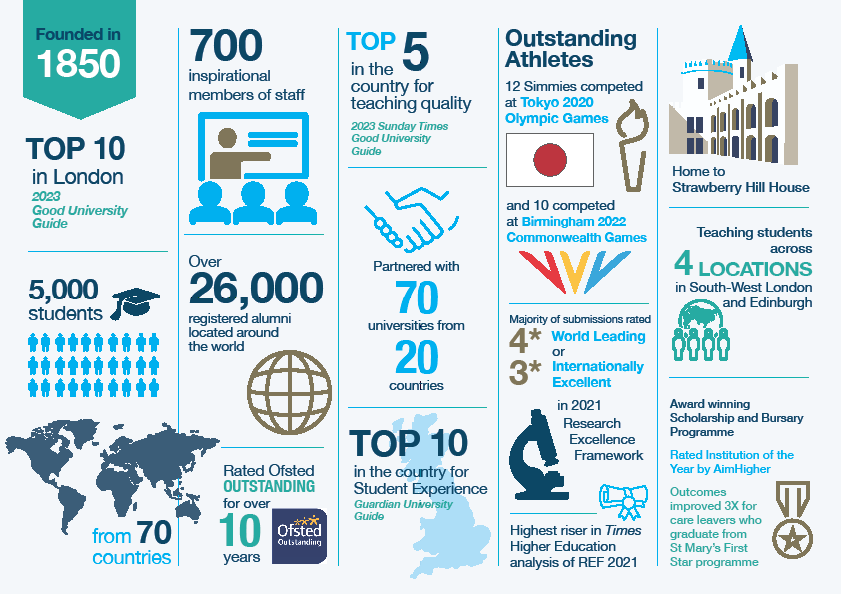
Figure 1: St Mary's at a Glance
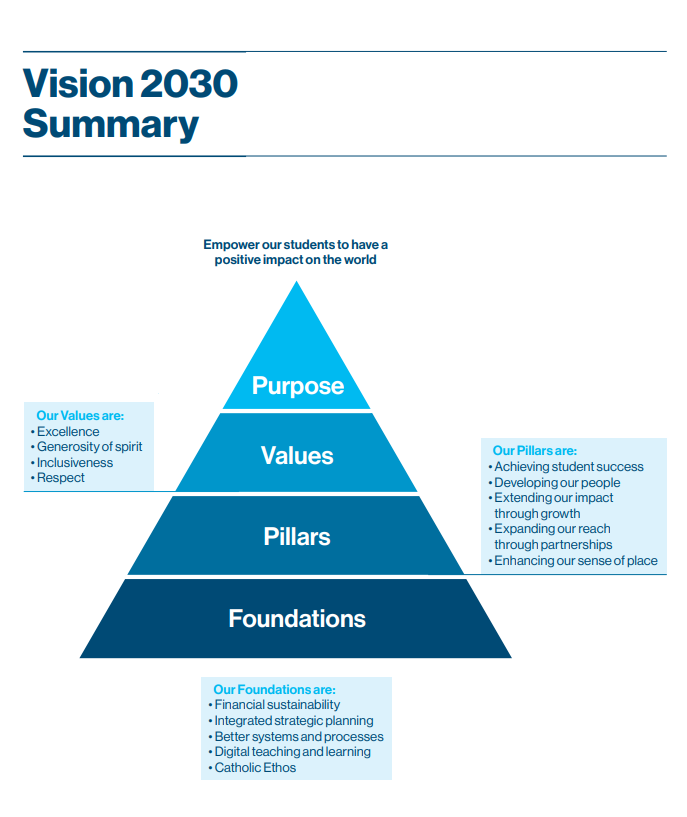
Figure 2: Vision 2030 Summary
For further information, please send queries to enterprise@stmarys.ac.uk
Local Growth and Regeneration
Summary of approach
St Mary’s University is embedded in its local community in West London and has established strong relationships with many local employers, businesses and community organisations. We work closely with our Local Authority and are actively engaged both in Richmond’s Employment and Skills Taskforce and the South London Partnership’s programme of business support, working across South and West London with councils, universities, colleges and business organisations to provide skills development and support the growth of local businesses.
Our main focuses for growth are:
Skills development to support economic development and employment in the region
Educational improvements, particularly for those from deprived backgrounds
Specialist research, consultancy and training support for SMEs
Aspect 1: Strategy
Areas in which we work
St Mary’s is based in Richmond-upon-Thames in South West London, with the majority of our students from London and South East England, often from disadvantaged communities. We have partnerships with colleges, including London PT and Regent Colleges, in more deprived parts of London, reaching communities traditionally under-served by universities. We have close relationships with schools and businesses with many students undertaking placements within their degree programme. We gather intelligence from partner organisations to identify local skills and growth needs.
The University’s Exchange arts venue reaches beyond Twickenham and Richmond into diverse communities nearby. The Exchange aims to contribute to local communities through arts and wellbeing activities, providing access that may otherwise not be available, and reaching communities who do not usually interact with higher education.
Outside our immediate locale, we work in North Wales with Glyndwr University in Wrexham on teacher training and CPD, and in the North West of England our Centre for the Art of Dying Well works with hospices, the NHS and universities. We also have a campus in Edinburgh which offers postgraduate and CPD courses in Theology and Education.
Internationally, we work in Mauritius, West Africa and Southern Africa on education, particularly Catholic education, contributing to teacher training, CPD, upskilling of school leaders, and developing Early Career Researchers, which all helps improve educational outcomes in those areas.
Identification of need
St Mary’s works closely with the London Borough of Richmond-upon-Thames. We are active members of the local Employment and Skills Taskforce, which has carried out analysis of current and future skills gaps, and the South London Partnership (SLP), a collaboration of five local authorities, Richmond-upon-Thames, Kingston-upon-Thames, Merton, Croydon and Sutton, which has a well-researched and comprehensive Skills Strategy.
We are active members of Business Innovation and Growth (BIG) South London, which brings together the SLP with local universities, FE providers and employers. The SLP successfully bid to London’s Strategic Investment Pot to improve provision for small businesses, undertaking significant work to understand better business needs and growth opportunities, and identify effective interventions. BIG South London is targeting three key challenges:
Low productivity: South London is the least productive area of London, with GVA per hour worked 42% lower than Inner London
Low engagement: low awareness of support universities can offer, their relevance and potential benefits for businesses and communities
Lack of affordable start-up workspaces
This work has informed our strategy and approach with local SMEs.
The Exchange arts venue is owned by the Council and run by the University, and regularly hosts Council training and workshops supporting local employment and business growth. In addition, the creative industries are very important in Richmond, accounting for 16% of local jobs. The Exchange, and St Mary’s more broadly, contribute to the creative industries’ success and growth with degree programmes in Acting, Creative Production, Film and specialist Masters programmes, and through knowledge exchange. Prior to the building of The Exchange, the local council commissioned extensive research with community groups and businesses to identify their needs, which has been invaluable in developing the venue’s strategy and brand, designing an appropriate offer at the venue and within our Drama and Humanities department.
South West London is a hub for significant sporting activity, with the RFU at Twickenham Stadium, Lawn Tennis Association in Wimbledon, Harlequins Rugby Club, London Irish, London Scottish and London Welsh rugby clubs, rowing on the Thames and race courses at Sandown and Kempton Park. There are particularly high levels of sporting participation in the area, with Richmond regularly in the top ten most active boroughs in England, far above the national average. There are therefore large numbers of SMEs involved in sport, activity and wellbeing sectors with potential for this sector to grow. St Mary’s is involved with a number of local businesses in this sector, providing KE support to increase opportunities for growth and sustainability.
Strategic priorities
St Mary’s launched its new strategy in 2021, Vision 2030, with “expanding our reach through partnership” and “enhancing our sense of place” as key pillars. This strategy identifies areas of growth, including knowledge exchange, and highlights our strong emphasis on employability and working with the local community.
Our strategic priorities are grounded in our Catholic mission to serve the disadvantaged in society and improve our community, and we work with partners who have informed our strategy and approach. Overall our objectives are to support a more resilient and skilled local workforce, and to reduce the in-work poverty and higher unemployment which affect some of our surrounding communities.
St Mary’s strategic priorities for KE are:
Business support: working with local businesses, providing facilities and advice
Upskilling and retraining: to develop skills required locally, including in sports, wellbeing and creative industries
Education and school leadership: improving educational outcomes locally and further afield
Aspect 2: Activity
Business Support
St Mary’s provides support for SMEs, with dedicated pages on our website, and works through the BIG South London programme, a collaboration between local authorities and universities. Through this programme we have worked with a number of local businesses, providing bespoke consultancy and training for groups of entrepreneurs. We offer consultancy on a commercial and voluntary basis using staff and students, gathering feedback from clients to shape future provision and consider further areas to offer.
St Mary’s runs the Social Enterprise Knowledge Exchange Network, bringing together over 100, mainly local, members working in or with social enterprises. SEKEN runs seminars, conferences and practical workshops, and publishes research to support the growth of small social enterprises.
To grow the local economy, the University has invested in helping students start their own businesses. With support from Santander Universities, we set up Start Up St Mary’s providing training, support, mentoring and investment. A number of new businesses have been established, creating jobs and contributing to economic growth, including Gusto and Avril Cassell Health and Nutrition.
We work with SMEs in the sports sector, providing sporting expertise and business development support. For example, we have long-term partnerships with Orecco, Nurvv Run and Physical Mind, sharing expertise and working together to ensure these companies continue to grow. Alongside funding from the University and business, we have secured external funding for these relationships, including from Research Councils, the UK Space Agency and local business support funding.
Through working with a range of businesses in different ways, we have identified local needs, including assistance with developing sustainable growth strategies, tendering for work, and digital media, and we are expanding provision to provide courses and training to develop these skills in the local area.
Upskilling and Retraining
Short Courses and CPD are key to our local growth work: to provide training in skills that we know are needed locally and create opportunities for upskilling and retraining. We have invested in our Short Courses team over the last three years to expand capacity and serve a wider audience.
Sports and Wellbeing
We run a range of courses in areas of academic strength, such as sports massage, coaching, nutrition, anatomy, and health and wellbeing. Many of these programmes are industry-accredited to enable students to gain employment or set up their own business.
In the period following the pandemic, we have seen a change in demand for courses. Students are more focused on courses with accreditation and those specifically tied to employment. We have therefore invested in developing new programmes in areas of demand to enable students to develop the necessary skills to change career and increase their income, including new massage and rehabilitation courses, and a range of accredited public health courses. We are also investing in delivering courses in a range of formats, including face-to-face, online and blended.
Creative Industries
The Exchange arts venue was built as part of a local redevelopment. We run it, in partnership with the council, providing community arts access and reaching those not previously engaged with higher education. The Exchange provides opportunities for students and casual staff to gain experience working in a theatre, in both paid and voluntary roles, in customer service, front-of-house and technical roles. It also provides a venue for new acts, small arts businesses and charities to grow and contribute to the local economy.
We run a range of arts-related short courses, such as Creative Writing, Screenwriting and Art & Painting, and have expanded our offer, including credit bearing courses. A number of students on our creative writing programmes, both short courses and postgraduate, have had their works published. We gather feedback from students and local organisations to identify potential programmes and courses, using intelligence and market analysis to identify gaps in local provision to shape our short course strategy. We also provide space to a large number of local arts, dance and drama businesses, who between them provide a vibrant range of activities and skills development for the local community.
Education and School Leadership
St Mary’s has significant expertise in Education and teacher training and we provide a wide range of training and CPD for teachers and schools. Our traditional focus on RE, PE, school leadership and primary science has significantly expanded since the pandemic, and we are working with schools to help them improve pupil standards post-Covid, including Special Educational Needs and Disability (SEND) support. We provide support in areas including literacy, English, Maths, Geography, Modern Foreign Languages and RE, and our primary science work has expanded, with Primary Science Quality Mark leaders helping schools to improve the quality of science teaching to increase the number of children leaving primary school with a solid grounding in science and maths, supported by research clusters.
The SLP skills strategy identified a steep increase in the number of pupils with SEND in schools across the five boroughs. St Mary’s has postgraduate programmes and a research cluster working on this subject, which works closely with our interdisciplinary educational wellbeing and resilience research cluster, in partnership with the South London and Maudsley Mental Health Trust (SLaM). We have expanded provision of postgraduate courses, CPD and skills development for schools in inclusive education and SEND, delivered teacher conferences to support the improvement of mental health provision in schools, and developed a Teacher Wellbeing Award which is being piloted with teachers and school leaders.
We also work to ensure those from disadvantaged backgrounds have a better chance of succeeding in education: we have a research centre dedicated to the education of marginalised children; we run the First Star Academy which aims to get young people in care into further and higher education; and we are partners in the Transitions Hub, improving the educational chances of young people in care whose placement changes.
These projects will improve social inclusion for children with special needs and those living in care, and contribute to economic growth by ensuring more vulnerable children are able to fulfil their educational potential.
We also work with Achieving for Children, which runs children’s services in Kingston, Richmond and Windsor, to support their career development programme, offering day visits and careers camps in subjects including physiotherapy and sports rehabilitation. We provide similar opportunities to Aim Higher and many local schools, regularly offering internships to young people with SEN studying in local FE colleges. This work supports young people from disadvantaged backgrounds, encouraging them to continue in education, contributing to social inclusion and economic growth.
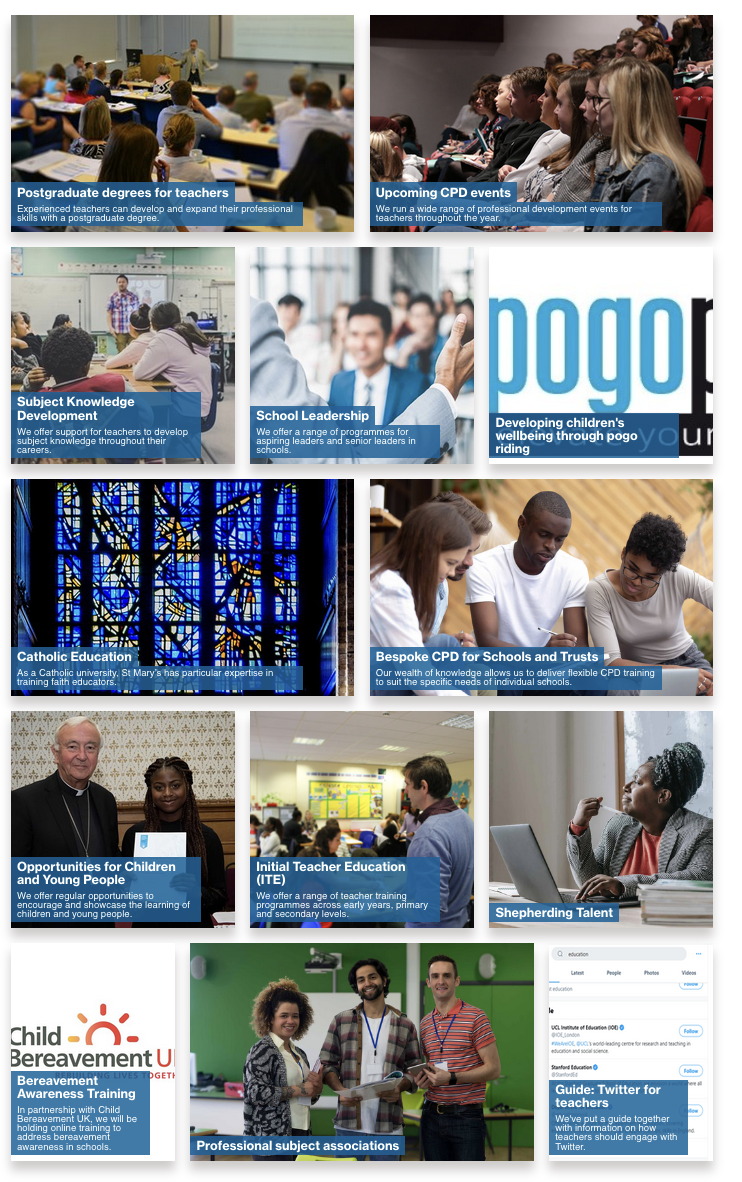
Figure 1: CPD and Training in Education
Aspect 3: Results
Business Support
We have a number of long-term relationships with local businesses, which have grown and changed over time to serve the needs of the business. The success of these partnerships is demonstrated in the length of time they have lasted, which in some cases is over a decade. We have also received external validation, for example our partnership with Nurvv won an award from the South London Partnership for Outstanding Collaboration in Technical Innovation.
We continue to deliver support for new businesses through the BIG South London programme, providing consultancy in whichever area the business has identified they need most. This ranges from hard scientific support to market research and advice on developing strategies for growth. The impact of this support is evaluated through the South London Partnership and feedback from participating businesses is regularly used to shape and update the programme.
Our programme providing start up support for students has grown in recent years, demonstrating that it is serving a need. The numbers of students successfully completing the programme and starting their own business has grown and a number of student start ups are still successfully operating after 3 years, contributing to employment and economic development in the local area.
Finally, as an active member of the Richmond Employment and Skills Taskforce, we regularly receive feedback from local businesses and public sector bodies about the skills gaps identified and the future direction of the local economy. This information is fed into our thinking and planning for KE and also our broader academic offer, to ensure that as a University our graduates are well placed to gain employment in the local area or set up their own businesses and help grow the local economy.
Upskilling and Retraining
Patterns of behaviour for students attending short courses or CPD have changed very significantly since before the pandemic. We have amended our programmes to become more flexible and provide what students want, including enabling students to move between cohorts and defer more often, moving more content online to enable students to study blended programmes, and providing short CPD sessions to enable existing practitioners to upskill and create new services for their clients. Student numbers are recovering post Covid, which demonstrates that there is demand for our offer and how we are delivering.
We have spoken to current and previous students to identify further courses or CPD that they would find useful and developed new training based on this feedback.
Our offer has increased to 80 different programmes, with over 4000 learner days in 2022-23. We monitor the number of inquiries, applications and participants on each course to support the evaluation by participants and tutors. This data informs decisions about course choice, design and content to ensure programmes are relevant, well delivered and serve community needs.
Education and School Leadership
For some educational programmes, such as First Star, we measure school performance, including GCSE, BTEC and A Level results, to identify the improvement over expected results following our intervention, as well carrying out formal evaluation. In other areas, it takes much longer to see the impact so we measure engagement indicators, such as the number of teachers attending training or conferences and the number of schools with whom we work. We have provided Subject Knowledge Enhancement to 438 students over the last three years in 8 subjects, to build teacher supply capacity locally and significantly expanded our CPD offer for schools, based on feedback and requests from schools.
Other projects have formal evaluation built in, such as the Transitions Hub project working with children in care, which is being evaluated by external evaluators to help the Youth Endowment Foundation build an evidence base to determine ‘what works’ in improving outcomes for children and young people. This evaluation will be used to shape future policy decisions.
Public & Community Engagement
Summary of approach
St Mary’s public and community engagement aligns closely with the university’s overall strategy, with a focus on sport and wellbeing, education, supporting vulnerable communities, influencing public debate and our Catholic mission.
We make extensive use of our facilities, from our world-class sporting amenities to our arts venue The Exchange, to ensure that a wide range of people benefit from our facilities and can access services using specialist equipment and expertise.
Our mission to support the more vulnerable in society is interlaced throughout our public engagement, including the Centre for the Art of Dying Well, the Bakhita Centre’s work with survivors of slavery, work with children in care, using sport to address social inequalities, and working on mental health in schools.
Aspect 1: Strategy
Strategic Approach
In 2021, St Mary’s published a new strategy, Vision 2030, with ambitious aims to engage with and embed the University in our local community. It includes a commitment to “open up our work to the public and strive to have a positive impact in our local community. We will play a dynamic role in the educational, cultural, sporting and economic life of south west London.” There are objectives relating to engaging with the community, sharing knowledge and improving civic engagement.
We have mapped our engagement to identify the different types of activity and groups with whom we engage, in order to better inform our strategy. We have identified key audiences as those working in education and those engaged in professional and community sports. We also offer a wide range of events for the general public.
Underpinning Vision 2030, we have developed our Knowledge Exchange strategy, available on our website for staff, students, stakeholders and members of the public to see. In addition, all our research centres have public engagement strategies, with information available about events, publications, projects and opportunities to collaborate.
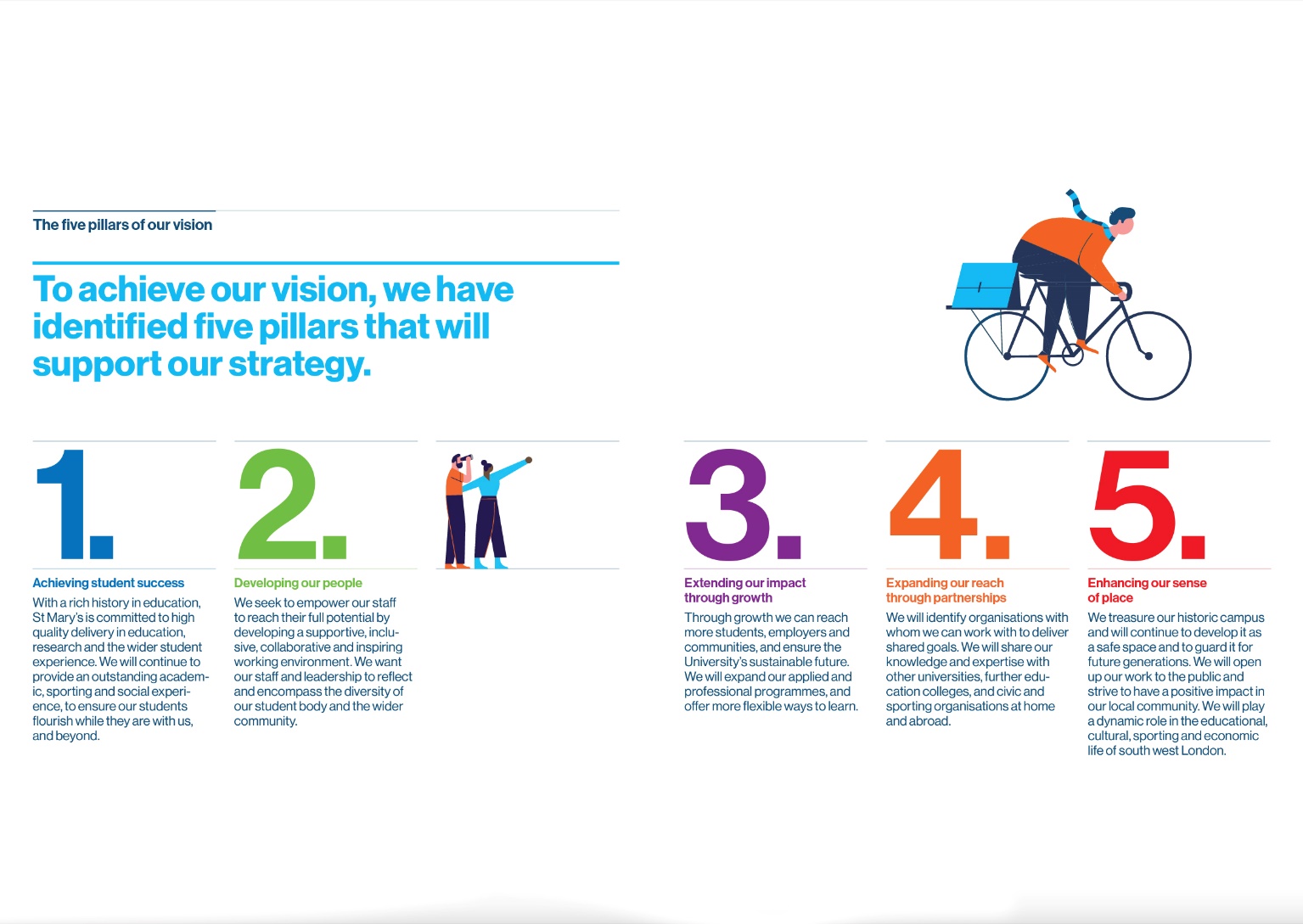
Figure 1: Five Pillars of Vision 2030
Strategic Themes
The four strands of our KE strategy are:
Using our research to have an impact
Expanding the reach of our short courses
Making best use of our world class facilities and equipment
Increasing staff and student engagement in knowledge exchange and public engagement
For our public and community engagement, we have a number of strategic themes:
Sport and wellbeing
Education
Catholic mission
Serving vulnerable communities
We have a wide range of sporting engagement: children’s sports clubs, physiotherapy and rehabilitation services, gym membership, staff and student involvement in local clubs. We make extensive use of our world class facilities, including rugby and football pitches, athletics track, state-of-the-art fitness and conditioning suite, labs and performance education centre. Our KE work is shaped by our partners as we consider their needs.
On wellbeing, we have worked with AgeUK to provide programmes including Man with a Pan, teaching single older men how to cook, improving their diet and providing social interaction, and a series of interactive sessions on subjects such as history, 3D printing and artificial intelligence. At The Exchange arts venue we host community arts and wellbeing activities for all ages and provide intellectual stimulation through short courses, lectures and events, shaped by public demand. Our students also provide physiotherapy services to the community on our main campus.
We work closely with a large number of schools, sharing expertise and experience. This includes providing a broad range of CPD and training and running programmes to develop a public policy evidence-base, including support for children in care and improving teacher wellbeing.
Contributing to our Catholic mission, St Mary’s hosts the Centre for the Art of Dying Well, providing a website, podcasts, training, support and advice for those facing death or bereavement. Public engagement is at the heart of the Centre’s strategy, working with partner organisations, such as Demos, to carry out research, and St Vincent de Paul Society to develop and deliver training for those delivering frontline support. We are also working with hospices, the NHS and other universities to improve policy relating to end-of-life support.
Serving vulnerable communities is interwoven throughout our work, including the Centre for the Art of Dying Well, the Bakhita Centre’s work with survivors of slavery, First Star’s work with children in care, using sport to address social inequalities, and working on mental health in schools.
Delivery
Our Enterprise and Innovation Department, which is responsible for Knowledge Exchange, oversees relationships with external partners including the local authority, charities, businesses and employers. Regular communication is fundamental to the department’s work, ensuring that we are serving the needs of our local community, businesses and civic organisations. Feedback from stakeholders has informed our strategy and continues to shape our engagement.
To support academic staff with undertaking engagement activity, we have recruited specialist expertise with legal, financial and marketing staff enabling academics to expand KE activity and contribute to our local community. The department also oversees stakeholder mapping with the local authority and local businesses co-ordinating relationships and ensuring our strategy and delivery take account of local needs.
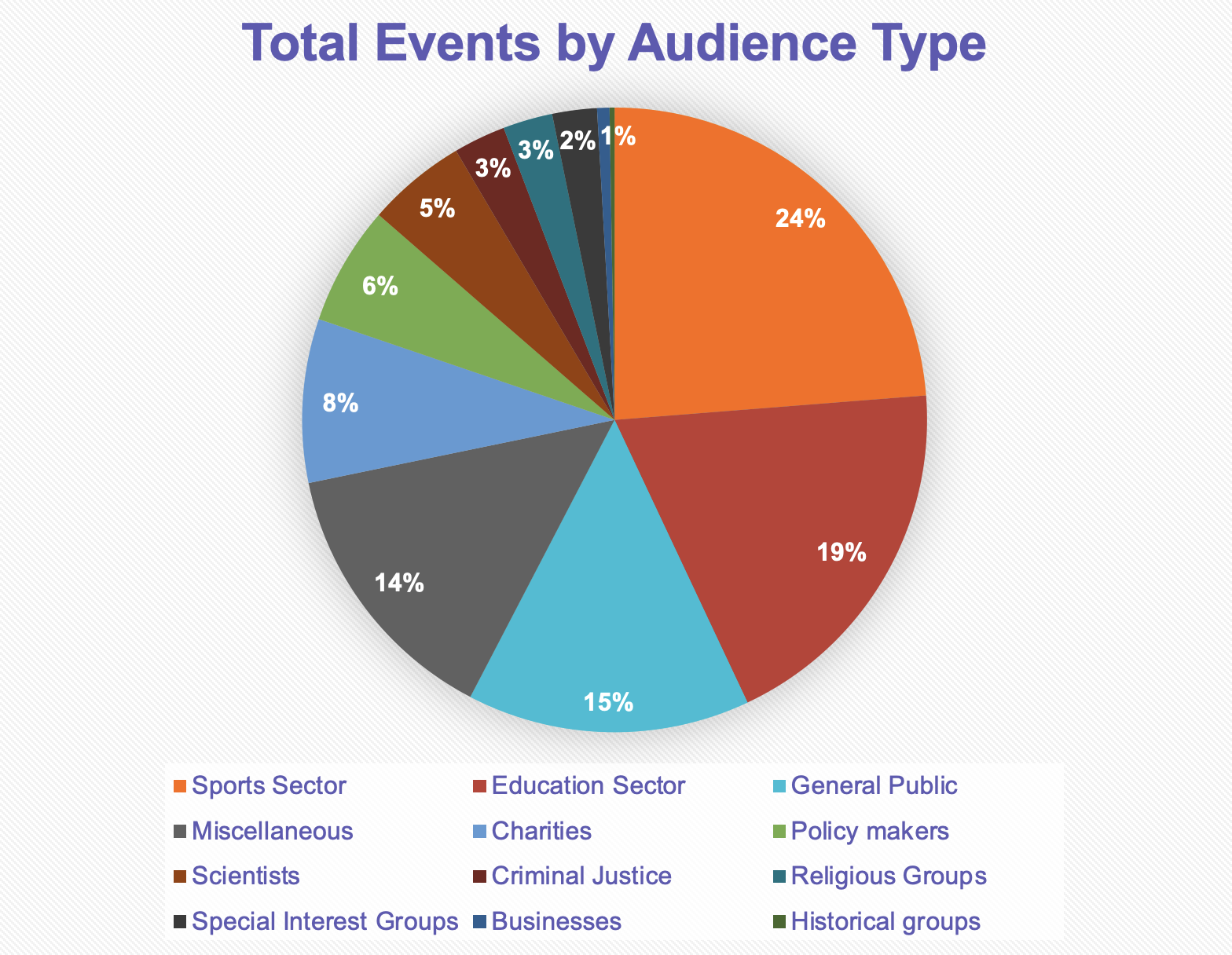
Figure 2: Total events by audience type
Aspect 2: Support
In order to support the delivery of our KE and engagement strategies, St Mary’s provides a range of support for staff and students, including specialist expertise, access to physical resources, and incentives to encourage and support academic staff.
Staff Resource
Across the institution, a large number of academic staff undertake engagement activities, enabled through workload planning. Dedicated professional services staff provide support: advice and help managing partner relationships; professional bid writing, project management and donor stewardship; legal and marketing support; expertise in organising lectures and conferences; and developing and managing short courses and CPD.
Training is provided for research students and early career researchers within the Researcher Development Programme, and we have a range of experts-in-residence available to staff and students year-round, including in Impact and Public Affairs, Public Engagement, and Public Service.
The Enterprise and Research Offices provide financial support for public and community engagement with recent grants supporting the Spice of Life Festival, part of Being Human Festival, involving community groups, students and staff from different disciplines; converting Nutrition qualifications into online materials in response to community demand; and working with the NHS to identify more effective ways to reach patients in hard-to-access communities. Enterprise and Development also access external funding for engagement, including CPD for educators on stalking, training for frontline workers in identifying victims of slavery, and engaging school children on science in space and carbon reduction.
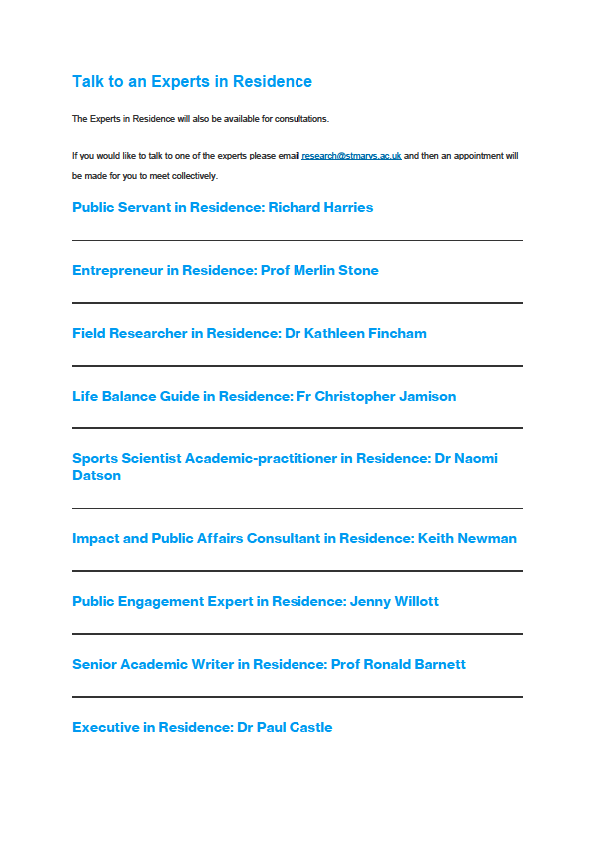
Figure 3: Experts-in-Residence
Physical Resources
Physical resources are provided free or at low rates for public engagement, including the Nutrition Suite, laboratories, Performance Education Centre, sports facilities and drama facilities.
Our Nutrition Suite is used for AgeUK’s Man with a Pan; schools hold sports days on our Olympic-standard Athletics track; and facilities at Teddington Lock support local rugby and soccer clubs. Staff provide advice, consultancy and training to a wide range of audiences using specialist facilities, including amateur and professional sportsmen and women, children, students and the local community. All our sporting facilities are available for use by the general public, elite athletes, and by national sporting organisations to upskill staff and provide training.
The Exchange arts venue offers public lectures, classes and activities, hosting a large number of local community groups, small businesses and charities. The Waldegrave Suite is used for public talks and events, and is available for hire, all supported by specialist staff who assist with organising public events.
Recognition and Reward
Public and community engagement is considered key activity for academic staff. Time for enterprise and engagement activity is built into workload and recognised and rewarded on our career paths. We have four routes to promotion, including Enterprise & Engagement and Professional Practice. All routes enable promotion at all levels from senior lecturer to professor and staff across the University have successfully applied for promotion based on their enterprise and engagement activity, raising the profile of public engagement within the University and ensuring it is rewarded in a meaningful way.
Aspect 3: Activity
In line with our strategic themes, activities are focussed on sport, wellbeing, vulnerable communities and Catholic mission.
Sporting engagement
Our objectives are enabling community use of our facilities, sharing expertise with elite athletes, and creating opportunities for students to engage in KE, delivered via:
Children’s sports clubs run after school and during holidays: we welcome over 8,000 children each year, offering a range of activities with trained coaches, many of whom are St Mary’s Students. We encourage regular physical activity, including through football, rugby, athletics and gymnastics.
Consultancy services to athletes, community sports clubs and the public: we operate physiotherapy and rehabilitation clinics, providing experience for students; fitness training; gym membership; and strength and conditioning support.
Students working with amateurs and professionals in a variety of sports in partnerships that create hands-on experience for students and staff through placements, knowledge exchange and research opportunities.
Our sports scientists provide support and advice in community settings, for example rehabilitation and analysis support at London Scottish Rugby, coaching and advising Teddington Junior Cricket, and providing support to participants at the London Marathon..
Strength and Conditioning support for the Royal Ballet: enhancing dance performance, injury prevention and recovery after injury, with work informing several research projects.
Weir Archer Academy for wheelchair athletes: enabling disabled athletes to use our sport science and strength and conditioning facilities, giving St Mary’s students the opportunity to provide sport science support and coaching to Paralympic athletes.
These programmes improve levels of activity and fitness amongst the general public and contribute to community sport. They help develop new knowledge and skills amongst students and staff, creating valuable experience and opportunities for students to gain coaching qualifications, and benefiting the local community.
Wellbeing and healthy ageing
Working with partners, we aim to improve physical and mental wellbeing via:
With AgeUK, providing mental stimulation and wellbeing programmes
Hosting community arts and wellbeing activities for all ages at The Exchange, including pregnancy yoga, older people’s dance classes, children’s drama, arts classes for adults with mental ill health or learning disabilities, and intellectual stimulation through short courses and events.
Developing breast health awareness materials for schools, to increase teenage girls’ activity levels.
Working with South London and Maudsley NHS Trust on mental health in schools, including developing a Teacher Wellbeing Award.
These programmes contribute to increased wellbeing locally, with improved levels of fitness and intellectual engagement, and contribute to research development.
Vulnerable Communities and Catholic mission
Our Catholic mission underpins and informs many of our engagement activities, both contributing to the public sphere and supporting vulnerable communities:
The Benedict XVI Research Centre on religion within contemporary societies has an extensive public engagement programme, including participating in debates in Parliament on subjects like criminal justice policy and undertaking media activity.
The Catholic Social Thought blog considers political and societal dilemmas through the lens of Catholic social principles, with subjects as diverse as climate change, modern slavery, government regulation, Ukraine and lobbying.
The Centre for Bioethics and Emerging Technologies runs public lectures and seminars.
We run A-Level conferences in Theology and Ethics, alongside an Essay Prize for students.
The Art of Dying Well provides resources and podcasts for those dealing with death.
The Bakhita Centre for on Modern Slavery works with the Santa Marta Group and Bakhita House to research, combat slavery and provide practical support to survivors.
St Mary’s First Star Academy works with young people in care to help them achieve at school and go on to higher and further education, with extraordinary results.
The Guardians of Creation programme includes research, toolkits and analysis to help Catholic dioceses decarbonise.
These programmes enable St Mary’s to contribute to important public debates and shape the delivery of public services, whilst ensuring often overlooked communities are able to contribute and have their voices heard.
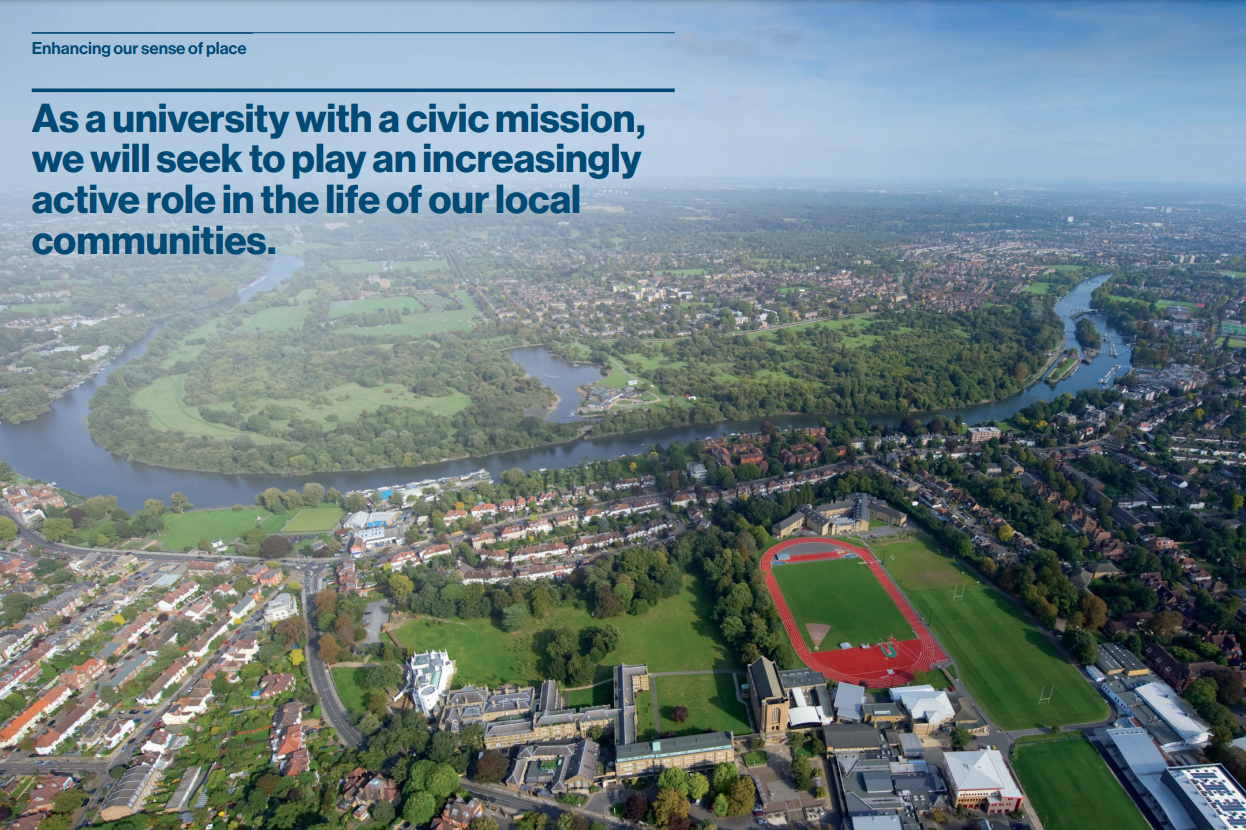
Figure 4: St Mary's campus and commitment to Place
Aspect 4: Enhancing practice
We evaluate the impact of our activity through a range of KPIs: for example, quantitatively we monitor engagement with public events through footfall data, ticket sales and our HE-BCIS return, and uptake of our short courses and CPD through learner numbers. We measure the numbers of attendees at SIMMSport each year, and use KPI data to monitor the employability of our graduates, looking at levels of engagement with KE activity. Qualitatively, some KE projects have evaluation and feedback embedded within the design, and we commission external evaluations of some larger projects.
We have identified the need to develop an institutional approach to evaluation as an action within our KE Concordat action plan and will be developing this in the future. Examples of our current range of approaches to evaluation include:
Individual Evaluation
Conferences, short courses, sports services, public lectures, AgeUK programmes and practical sessions are evaluated by individual participants. This feedback is used to shape future delivery and the development of new provision, and ensure we are meeting needs.
In-built evaluation and monitoring
Our programme with the Royal Ballet has continuous monitoring, assessment and evaluation designed into the programme. We monitor dancers’ engagement with strength and conditioning training, adjusting the programme to increase engagement levels. We then assess the impact of sessions on reducing injury incidence and disseminate findings through conferences, articles and media coverage. The Bakhita Centre’s Summer School for survivors of slavery had evaluation woven through from the outset.
Research outputs
Our work with teachers on mental health in schools is informing research in this area, including journal articles and conference presentations. Our First Star programme was independently evaluated, with valuable research analysis feeding back into the design of the programme.
Quantitative monitoring
The Art of Dying Well monitors website and podcast traffic using detailed analytics. Last year it had over 179,000 unique visitors, and the Centre uses the traffic and dwell times to understand what visitors want to shape their output.
External Evaluation
The Art of Dying Well commissioned Marjon University to evaluate the End of Life Companionship programme, with findings published in journals and used to inform public debate. External evaluation of the Transitions Hub project, working with children in care, is being used to create an evidence-base for public policy.
Aspect 5: Building on success
Governance Oversight
St Mary’s Enterprise Board monitored and co-ordinated enterprise and KE activity across the University, and reported into the University’s Executive Committee. Attended by the Vice-Chancellor, members of the SLT and senior deans and directors, as well as an external representative, the board oversaw activity by academic units and central KE teams. This enabled planning and co-ordination, as well as identification of key opportunities or challenges. Issues identified at the Enterprise Board were used to inform the shaping of central KE support, plan activity and support budget rounds.
As a result of issues identified, we have adapted the central support offered with the recruitment of legal and marketing staff to support academic KE activity and we are working to create more online resource to support public engagement.
The University regularly monitors KPIs and other performance data, including engagement activity. These are reported at University Executive Committee, SLT and Board of Governors, covering areas such as engagement, employability, knowledge exchange and research.
Benchmarking
We have used data from HE-BCIS to benchmark performance against our KEF cluster and other comparator groups, which has helped us understand where we have potential to increase activity and where we already perform well. This analysis has informed our strategy and shaped activity.
Evaluation and review
As part of our review of the University’s strategy in 2021, there was consideration of key audiences, our community role and priority work themes, using data analysis, feedback, evaluation of progress, areas of success and challenges. We have looked at how KE activity is recognised and rewarded through academic promotion, and amended the guidance for staff and provided more support to encourage academics to pursue this route. This has led to an increased number of staff gaining promotion as a result of KE and engagement activity and contributed to an increased number of staff participating in outreach and KE.
Note You are currently viewing the latest version of this narrative statement. View the previous version as published in previous iterations of the KEF (KEF1 and KEF2)